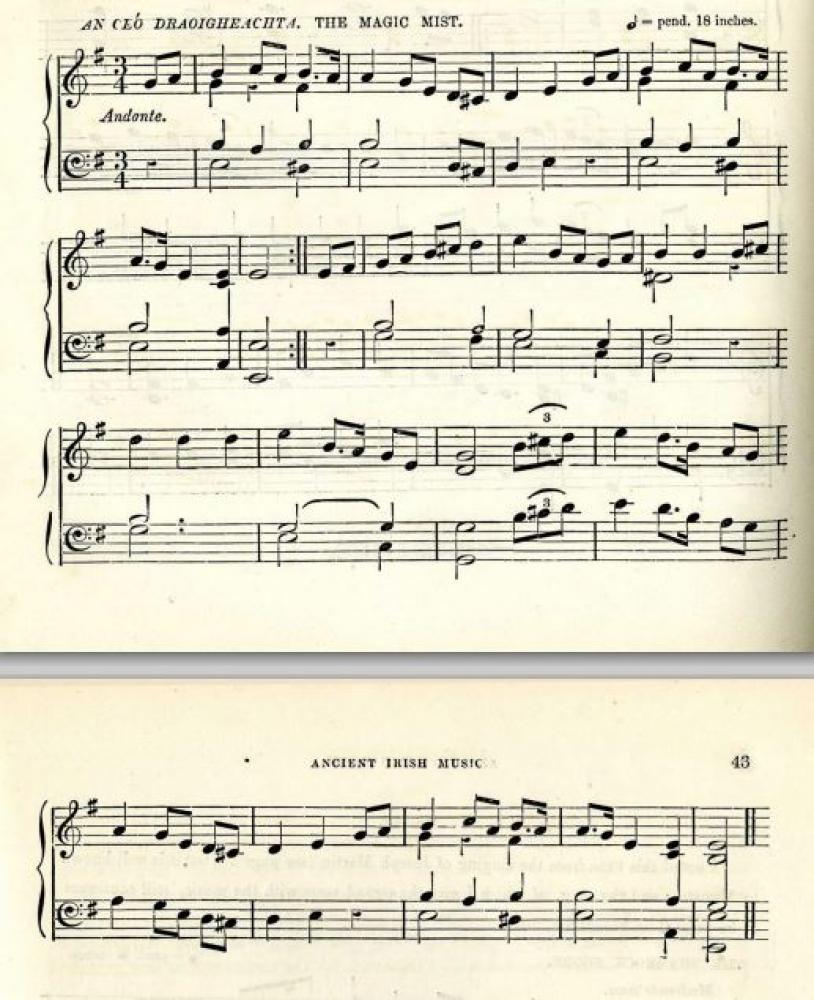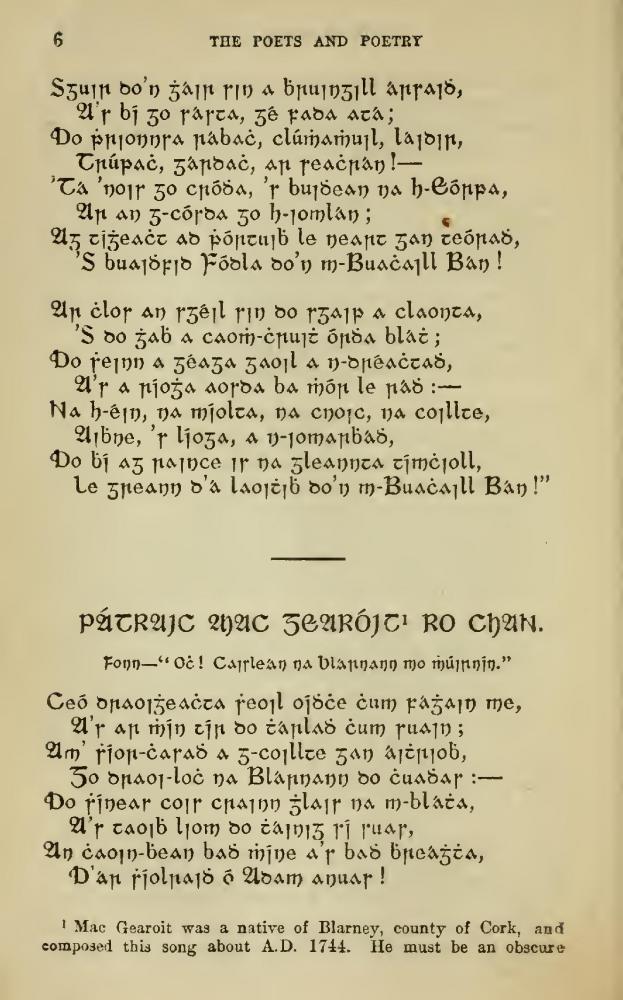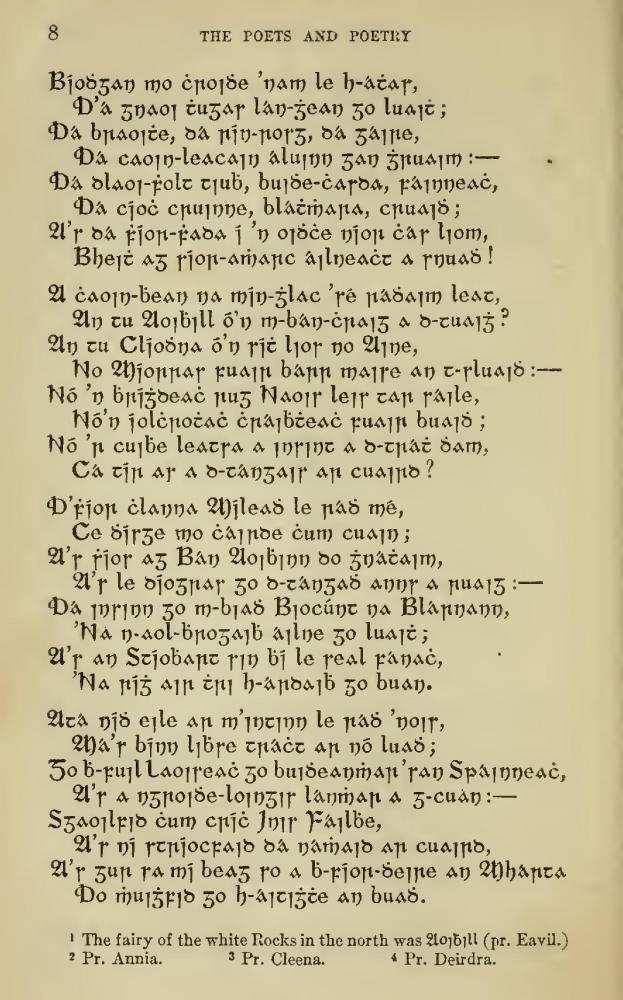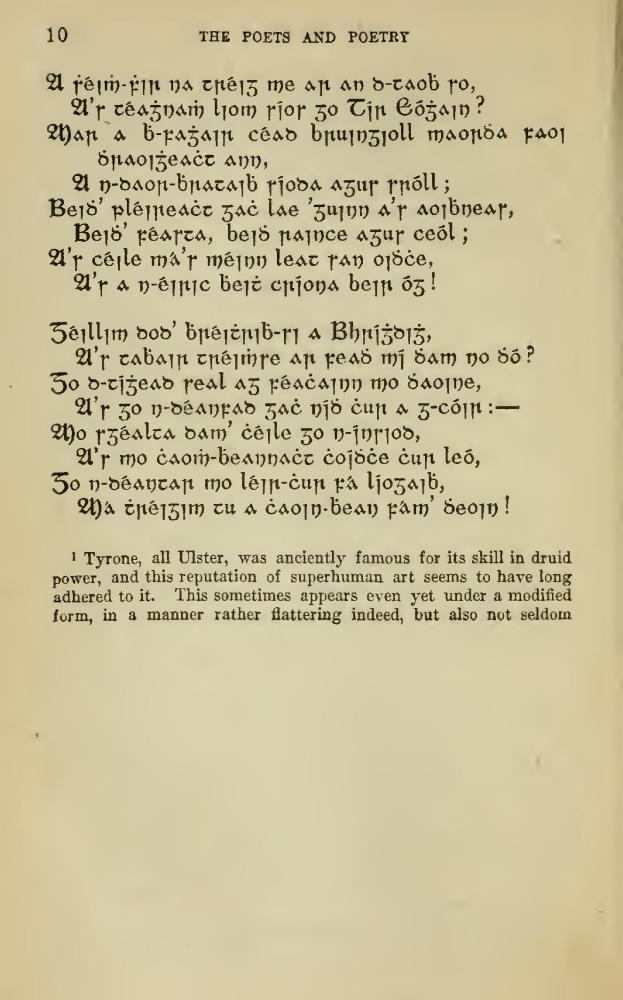An Ceo Draoigheachta
| TYPE | 3 - Complex Melody |
| TOPIC | Aisling |
| TUNE STRUCTURE | A6 B8 |
| VERSE STRUCTURE | 7v 8l |
| TIME SIGNATURE | 34 |
| KEY SIGNATURE | ♯ |
| TONAL CENTRE | E |
| INCIPIT | GA♭FGFFE♭CB♭,A,B♭,C |
| GENRE | Amhrán Mór |
| TEXT SOURCE | John O'Daly, The Poets and Poetry of Munster: A Selection of Irish Songs (Dublin: O' Daly, 1850; 2nd ed.) pp.6-11 |
| TUNE SOURCE | P.W. Joyce, Ancient Irish Music (Dublin: McGlashan and Gill, 1873), pp.42-43 |
| FIRST LINE | Ceo draigheachta sheoil oidhche chum fághain me |
| NOTATED INCIPIT | |
| Joyce links the tune, which he learned form the singing of Alice Kenny, Glenroe Co. Limerick, to this set of words from O'Daly's publication. The poem is, however, not the same as the more widely known 'Ceo Draoichta' of Eoghan Rua Ó Súilleabháin. Although the two poems share the same basic premise (the poet is visited by a fair-haired spirit after being caught up in a magic mist), Ó Súilleabháin's composition is explicit in its Jacobite sentiments, while a more deeply coded message about political unhappiness is found in the fifth stanza of the setting in O'Daly's book. It is clear, however, that the O'Daly setting is derived from the older Ó Súilleabháin composition. | |
Ceó draoigheachtaCeó draoigheachta sheoil oídhche chum fághain me,A’s ar mhín tír do thárladh chum suain;Am’ shíor –chasadh a g-coillte gan áithriobh,Go draoi-loch na Blárnann do chuadhas:-Do shíneas cois crainn ghlais na m-blátha,A’r taoibh liom do tháinig sí suas,An chaoin-bhean badh mhíne ‘s badh bhreághtha,D’ár shíolraidh ó Adam anuas!Bíodhgan mo chroidhe ‘nam le h-áthar,D’á gnaoi thugas lán-ghean go luaith;D’á braoithe , dá rín-rosg, dá gáireDa caoin-leacain áluinn gan ghruaim:-Dá dlaoi-fholt tiubh, buidhe –chasda, fáinneach,D’á cíoch cruinne, bláthmhara, chruaidh;A’r dá fhíor-fhada í’n oidhche níor chás liom,Bheith ag síor –amharc áilneacht a snuadh!A chaoin-bhean na mín-ghlac ‘se rádhaim leat,An tu Aoibhill ó’n m-ban –chraig a-d-tuaigh?An tu Clíodhna ó’n ríth lios no Aine,No Míorras fuair bárr maise an t-sluaidh:-Nó’n bhríghdeach rug Naois leis tar sáile,Nó’n íolchrothach chráibhtheach fuair buaidh;Nó ’r cuibhe leatsa a insint a d-tráth dham,Cá tír as a d-tángais ar cuallid?D’fhíor chlanna Míleadh le rádh mé?Ce dhísge mo chairde chum cuain;A’s shíos ag Bán Aoibhinn go ghnáthaim ,A’s le díogras go d-tángadh anns a ruaig:-Da inrinn go m-biadh Biocúnt na Blárnann,‘Na n-aol-bhrogaibh áilne go luaith;A’r an Stíobhart sin bhí le seal fánach,Na rígh air thri h-árdaibh go buan.Atá nídh eile ar m’intinn le rádh ‘ nois,Ma’s bin libhse trácht ar no luadh;Go bh-fuil laoiseach go buidheanmhar ‘ san Spáinneach,A’s a ngroidhe-loingis lánmhar a g-cuán:-Sgaoilfid chum crích Inis Fáilbhe,A’r ní stríocfaid dá námhaid ar cuaird,A’s gur sa mí beag so a bh-fíor-dheire an MhártaDo mhuighfidh go h-áitighthe an buadh.A rhéimh –fhir na tréig me ar an d-taobh so,A’s téaghnamh liom síos go Tír Eóghain?Mar a bh-faghair céad bruingioll maordha faoi dhraoigheacht ann,A n-daor-bhrataibh síoda agus sróll;Beidh’ pléireacht gach lae ‘guinn a’s aoibhneasBeidh’ féasta , beidh raince agus ceól;A’r céile má’s méinn leat san oidhche,A’r a n-éiric bheith críona beir óg!Géillim dod’ bhréithribh-si a Bhríghdigh,A’r tabhair tréimhse ar feadh mí dham no dhó?Go b-tíghead seal ag féacainn mo dhaoine,A’r go n-deanfad gach nídh chur a gcóir:-Mo sgealta dam’ cheile go n-ínsiod,Ar mo chaomh –bheannacht choídhche chur leó,Go n-déantar mo léir- chur fá líogaibh,Ma thréigim tu a chaoin-bhean fám ‘ dheoin!Transcribed from the text source by Patricia Caldwell.
The Spirit of BlarneyNight robed in a mist of enchantmentThe slopes and the glade-arching boughs,As, tired roaming where mansions scant, wentThe bard by the fay-lake to drowse.The branches of blossoms drooped overWhich, sudden a brightness illumed,And a Fay of all fairness did hoverWhere shadows druidic had loomed!My heart throbbed with rapture, and brightenedMy soul, ‘fore that nymph from above,For the smile from her brown eyes that lightenedSent my bosom a-thrilling with love!O, berry-red cheeks! And O, clusterOf curling gold hair to the knee!I could gaze the whole night on your lustre,And the night seem a minute to me!“The Brink of White Rocks hath it been a Retreat for thy beauty?” I said,“Art thou Ainne or Miorras or Cliona,O gentle and snowy-palmed maid?Art thou Deirdre whose wonderful fairnessLured a crimson-branch knight o’er the seaHast thou tidings of sorrow or rarenessFrom thy wand’rings to whisper to me?”“For Mili’s high clann I am grieving,Of that flower of the brave is my race,And long-long I’ve mourned in Ban-aoibhinnAnd yearned their return the THE CHACE.But know! – of the Viscount of BlarneySoon the voice in your turrets shall ring,And the Exile be victor in war, nay!Three islands will crown him their King!“These tidings thy clansmen to charm, orTo frighten their foes, bear away;-Our warriors in Spain don their armour,And the barques of white sails fill the bay.They’ll wing to green Erinn their way – tideAnd tempests shall scatter the foe,O, Freedom shall gladden ere Mat-tideThe true-hearted Lordly and Low!“And thou, wilt thou visit th’ entrancing,The beauteous green glens of Tyrone,Where a hundred bright maids, in silk glancing,Enchantment doth number her own!We’ll have festivals, dancing, and gladness,The harps shall light music outpour,The fairest fay love thee to madness,And thine age change to glad youth one more!”“O, fairest of Fairies! So sweet areThy words that I’ll fly to thy dell,Ere a month when I place my goods meeterAnd say to my kindred – ‘farewell!’The beloved of my youth I must give herMy kindest of blessings for aye,Then, from thee, gentle fay, If I severMay I swiftly go down into clay!”Translation from The Poets and Poetry of Munster: A Selection of Irish Songs, ed. John O’Daly (Dublin, 1860), pp.7-11.




